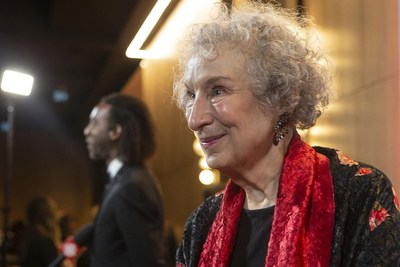TORONTO — Margaret Atwood doesn't believe there is a "wrong" side of history, so she doesn't pay much mind to how it will remember her.
"I don't care. I'm going to be dead," said Atwood, 82. "We might be surprised about that. Have an open mind. But it kind of doesn't matter. And I have no control over it."
The Canadian literary legend added a new book of essays, "Burning Questions," to her prolific bibliography this month. The collection consists of articles, speeches, book reviews, political commentary and other musings penned between 2004 and 2021 — covering a tumultuous period when, as Atwood sees it, the historic stakes of the issues we face seem more extreme and immediate, between the slow burn of the climate crisis and threats to the future of representative democracy.
But Atwood said she doesn't write with posterity in mind, concerning herself more with the fate of the living rather than the caprices of legacy.
"What usually happens is immediately after you die, there's a big flurry of interest, and people do features on you.... Then you're out of date. People go, 'eye roll, eye roll, eye roll. Oh, her,'" said Atwood.
"They do that to a certain extent when you're old, anyway, roll the eyes. Unless you become instantly relevant, such as having a TV show that everybody thinks is prophetic. They don't roll their eyes right then. They wait a little while and roll them later."
This eye-rolling serves as a countervailing force against the "idolatry" of artists, Atwood said. It's a problem that's dogged the Toronto author since the hit TV adaptation of "The Handmaid's Tale" and her 2019 sequel, "The Testaments," ushered in her late-career renaissance as the "prophet of dystopia."
"I've been right too often," she said with a laugh. "They've forgotten all the times I've been wrong."
Aside from a recreational interest in tarot card reading, Atwood insisted she's not in the future-predicting business. If anything, "Burning Questions" shows her to be an astute reader of history, extrapolating insights into the current moment. Anything beyond that is up to us to decide, she said.
"You can look for signs and symptoms, and you can say, if we continue on this road, we're probably going to fall into a hole," Atwood said. "That is not to say that we will continue along that road."
In "Burning Questions," Atwood confronts the cascade of crises that have characterized the 21st century — from the U.S.-led war on terror, to the financial collapse of 2008, to Donald Trump's polarizing rise to the White House, to the COVID-19 crisis — with an unsparing sagacity that makes the essays both timely and timeless.
Atwood's drumbeat of admonitions holds steady over the nearly two decades the collection covers; the world changes to give new resonance to her observations about the dangers of environmental ruin, creeping totalitarianism and social unrest during pandemics.
Throughout her career, this clarity of conviction seems to have inured Atwood to the whims of the zeitgeist, placing her consistently ahead of her time. But in recent years, that same independent streak has put her out of step with certain circles of the contemporary feminist movement.
Her latest dust-up surrounded a tweet last fall sharing a Toronto Star op-ed titled, "Why can't we say 'woman' anymore?" The article by Rosie DiManno argued that the growing embrace of gender-inclusive language, such as "person who menstruates," raises concerns about the lexical "erasure of women." Some critics accused Atwood of amplifying anti-transgender dog whistling.
In an interview last month, Atwood shrugged off the controversy.
"I don't care. I'm well on record of saying trans rights are human rights," she said. "When I was (tweeting about) trans rights ... and the science on it, I was getting trolled by people who disagreed with that. And that's how it goes."
Atwood said she's proven resilient in the culture wars because she's more interested in the truth than pandering to the dogma du jour.
Some people are inclined to think of time as a linear march toward progress, Atwood said. But in her view, there is nothing inevitable about how history unfolds, so there's no point in trying to be on the "right" side of it today when you could find yourself on the "wrong" one tomorrow.
This is particularly true of posthumous artistic reputations, she said, which tend to rise and fall with the ever-churning cultural tides.
"You have a period in which people would ignore your awful things that you did and concentrate on the good ones. And then you have another period in which your seeming missteps are dredged up and held against you," Atwood said.
"If things settle down, then you go into oblivion for a while and then someone makes a miraculous discovery of you. Dig up your pyramid. And lo and behold, look who we've been overlooking all these years."
This report by The Canadian Press was first published March 10, 2022.
Adina Bresge, The Canadian Press
Views: 5
